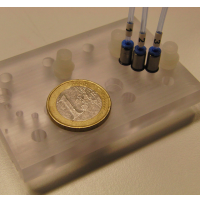Is This the Beginning of the End for Animal Testing?
 Synthetic organism on miniature chip (photo: Fraunhofer IWS)
Synthetic organism on miniature chip (photo: Fraunhofer IWS)
Animal testing could someday be replaced by advanced microchips currently under development in Europe and the United States.
The German research organization Fraunhofer Institute for Material and Beam Technology has created a “synthetic organism on a miniature chip” that can simulate a human body for the purposes of testing new medicines. If successful, it would eliminate the need to test new therapies on animals, which are currently used at the early stages of drug testing.
Such a development “would be nothing short of a revolution to the pharmaceutical industry,” according to SingularityHub.
The way the chips work is human cells are implanted into the wells of the chips and are then connected to each other via tiny canals. “A micro-pump stands in for the heart, circulating cell culture between the ‘organs’ to more closely synthesize these systems in vivo,” Jason Dorrier wrote.
“We use cell samples from various sexes and ethnicities. We can set variations in body size and weight as desired on a scale of 1:100,000,” Dr. Frank Sonntag of Fraunhofer said in a press release.
In addition to Fraunhofer, the Wyss Institute at Harvard has founded the startup company Emulate to produce a “human on a chip” on a transparent piece of microfluidic silicone rubber. And at Scotland’s Abertay University, Professor Nikolai Zhelev has mass-produced thousands of miniature hearts 1 millimeter across that can beat 30 times a minute, according to The Guardian. “Mini hearts are much better than using animals to test drugs – they are closer to the real thing and they should speed up the time it takes to move towards clinical trials,” Zhelev said.
-Noel Brinkerhoff
To Learn More:
“Organs-on-a-Chip” Aim to Eliminate Animal Testing from Drug Research (by Jason Dorrier, SingularityHub)
Mini Synthetic Organism Instead of Test Animals (Fraunhofer)
How Tech Could Spell the End of Animals in Drugs Testing (by Mark Piesing, The Guardian)
Bias Found in Animal Medical Research for Human Brain Disorders (by Danny Biederman and Noel Brinkerhoff, AllGov)
30% of Drugs that Work on Animals Don’t Work on Humans (by Noel Brinkerhoff, AllGov)
- Top Stories
- Unusual News
- Where is the Money Going?
- Controversies
- U.S. and the World
- Appointments and Resignations
- Latest News
- Trump to Stop Deportations If…
- Trump Denounces World Series
- What If China Invaded the United States?
- Donald Trump Has a Mental Health Problem and It Has a Name
- Trump Goes on Renaming Frenzy






Comments